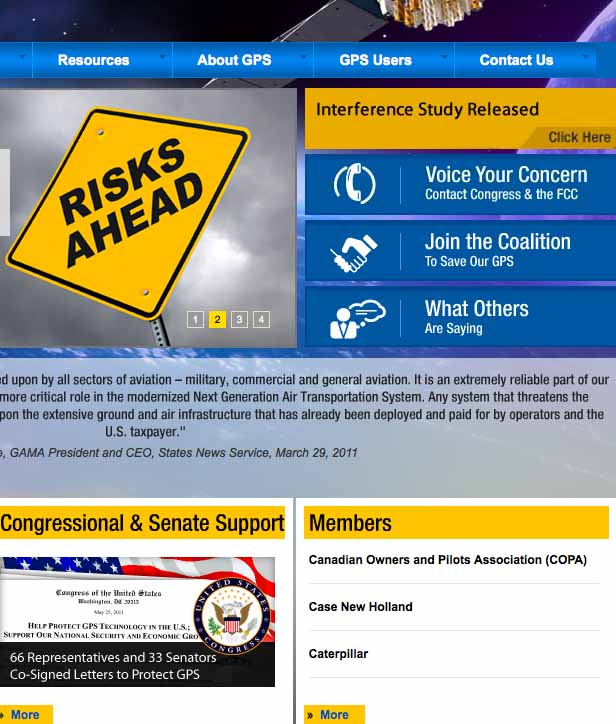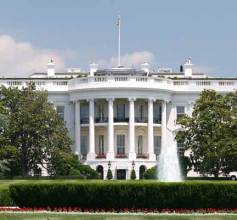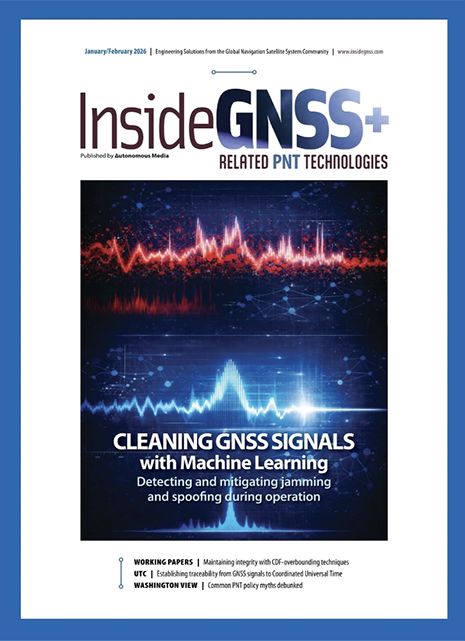 Tim Farrar, TMF Associates
Tim Farrar, TMF AssociatesWhile members of the GPS community are pushing to formally end the threat of signal interference from LightSquared’s proposed wireless network, the political realities of an election year suggest they will have to wait for a decision.
“There are not a lot of reasons to rush,” said Tim Farrar of TMF Associates, a consulting firm that closely follows mobile communications industry, adding it was “unlikely” there would be any progress ahead of the vote in November.
While members of the GPS community are pushing to formally end the threat of signal interference from LightSquared’s proposed wireless network, the political realities of an election year suggest they will have to wait for a decision.
“There are not a lot of reasons to rush,” said Tim Farrar of TMF Associates, a consulting firm that closely follows mobile communications industry, adding it was “unlikely” there would be any progress ahead of the vote in November.
On February 15, the Federal Communications Commission (FCC) proposed to vacate the conditional waiver under which LightSquared was working to establish its network of high-powered broadcast towers. The FCC also proposed to suspend indefinitely the firm’s authorization to build out its wireless broadband service based on testing that showed clear interference with GPS receivers. The agency asked for comment on the proposals and has yet to issue a ruling.
The decisive nondecision leaves LightSquared in limbo — and that is likely where it is going to stay for a while. As reported earlier by Inside GNSS, the matter will not be considered “ripe” for judicial review until after the FCC issues a decision. Putting off a final decision delays any appeals and the prospect of a politically charged court case.
Politics were a factor in the fight over LightSquared from nearly the beginning with critics suggesting the Obama administration had shown favoritism to the firm at the potential expensive of the GPS-using public.
The firm’s request for a waiver for the new network was pushed through the process so speedily that it raised eyebrows on Capitol Hill — as did the White House’s strong-arming of government officials to fall in line behind the proposal. The matter was further complicated when it was reported that President Obama owned stock in the firm’s predecessor SkyTerra for a brief time in 2005.
Members of Congress, mostly House Republicans, have held hearings into the LightSquared waiver and Sen. Chuck Grassley, R-Iowa, held up FCC nominations until he was assured of receiving copies of internal White House documents on the subject.
That does not mean that no action has been taken on the issue since February. Representatives of Garmin, a GPS receiver manufacturer and vocal critic of LightSquared’s plan, met with FCC officials on June 28. According to an FCC filing about the meeting, they urged the agency to make a decision on the waiver and suspension and not wait for decisions on other LightSquared proposals — including one to swap its frequencies for a different, non-interfering slice of the spectrum. Earlier in June, a Trimble official and corporate counsel made a similar visit to the FCC and delivered a similar message.
Spectrum Swap
The swap proposal, submitted formally by LightSquared to the FCC on May 17, has three options. The first involves LightSquared being allowed to use the lower 15 megahertz of the spectrum from 1675 to 1710 MHz, which is now used by NOAA weather satellites. The second would be a swap of LightSquared’s frequencies for a piece of the aeronautical telemetry band, which is used for flight testing, either at 1505 to 1525 MHz or 2360 to 2380 MHz. The third is to trade for some to-be-determined frequencies.
LightSquared declined to comment on the proposals when contacted for this article. “We are not publicly discussing our plans or our initiatives at this time,” said LightSquared spokesman Tom Surface.
LightSquared has gotten some support for a spectrum swap from a bipartisan group of House members. In a June letter to FCC Chairman Julius Genachowski, Reps. Jim Moran, D-Va., Maurice Hinchey, D-N.Y., Rodney Alexander, R-La., Steve Rothman, D-N.J., and Ander Crenshaw, R-Fl., backed the idea and reportedly suggested the spectrum come from frequencies allocated to the Department of Defense.
Selling a swap, however, will not be easy. The government has been working for years to clear additional spectrum, not just to encourage the economic growth that new broadban applications would bring but also to auction the frequencies off and make some money for the deficit-ridden federal government — a lot of money.
Other telecommunication carriers are also likely to object to a swap as an unfair windfall for LightSquared. The limits on the frequencies LightSquared bought were well known at the time and the price for them correspondingly low. To swap them now for unencumbered frequencies worth far more would likely cause an uproar.
As part of its swap proposal LightSquared also asked that “quick start” options be identified that would enable it to “expeditiously recommence deployment.” There is a need for speed — the firm is now in bankruptcy.
Further complicating the company’s future are charges by the Securities and Exchange Commission that Phil Falcone, whose hedge funds have been the primary investor in LightSquared, improperly took a $113 million loan from one of his funds to pay his personal taxes. The SEC also said Falcone played favorites with his backers, allowing some investors to exit the funds while restricting others from pulling out their money.
“Obviously the SEC stuff makes it harder for anything positive to happen that benefits LightSquared while Falcone continues to be involved,” said Farrar.
Despite financial pressures, suggested Farrar, LightSquared may not want a quick ruling from the FCC.
“The only thing that could happen in the near term, ahead of the election, is a negative ruling from LightSquared’s perspective,” said Farrar. “Anything positive would be controversial for the president and his reelection campaign.”
A post-election decision would likely create fewer political problems and, Farrar pointed out, increases the potential for a different set of players.
If things are delayed until after the election then LightSquared at least has the possibility of obtaining a different outcome that is more positive, he said, adding, “LightSquared might think is has a better chance of getting something out of a Republican administration.”
Dee Ann Divis is an editor at the Washington Examiner in Washington D.C. She writes the Washington View column for Inside GNSS.





